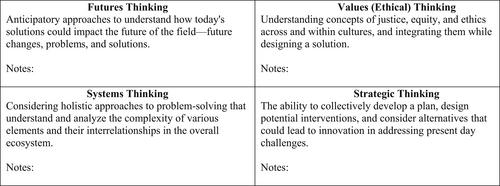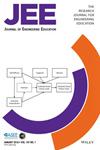Exploring the use of futures, values, systems, and strategic thinking among engineering education research collaborators
Abstract
Background
Multiple reports call for new ways of thinking to address challenges facing engineering education in the coming decades. Adopting these approaches first requires identifying and understanding existing ways of thinking among those engaging in engineering education research.
Purpose/Hypothesis
This study is motivated by the recently published Framework for Applying Ways of Thinking in Engineering Education Research (FAWTEER). The purpose is to determine if and how the four ways of thinking proposed under FAWTEER—futures, values, systems, and strategic—are practiced by engineering education research collaborators.
Design/Method
Seven engineer-social scientist collaborator pairs across heterogeneous research projects were interviewed in dyads. Data were analyzed using an inductive coding approach that was informed by the framework and literature.
Results
Emergent findings provided evidence of collaborators' use of futures, values, systems, and strategic thinking, but the interpretations and relevance of a particular way of thinking varied depending on the project context. Proposal calls, organizational structures and policies, intentionality, and culture were identified as determinants that could foster or hinder the implementation of different ways of thinking.
Conclusions
Ways of thinking may be taken for granted or partly ignored in research practices despite their potential influence on innovation. This study highlights how futures, values, systems, and strategic thinking are enacted in engineering education research and suggests the need to further explore connections between ways of thinking and cultures that exist at the departmental, institutional, and disciplinary levels.


 求助内容:
求助内容: 应助结果提醒方式:
应助结果提醒方式:


